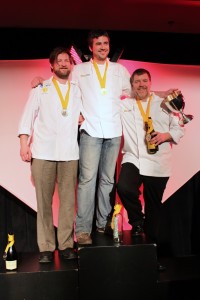
Last weekend we gathered in Kelowna B.C. for the Canadian Culinary Championships, bringing the winning chef from each of our eight Gold Medal Plates regional events to compete in three gruelling challenges. My team of judges, profound of palate and splendid in their impartiality, performed magnificently and I will name them first, proceeding from east to west: Karl Wells from St. John’s, Robert Beauchemin from Montreal, Anne DesBrisay from Ottawa, Sasha Chapman from Toronto, CJ Katz from Saskatchewan, Clayton Folkers from Edmonton, John Gilchrist from Calgary, Perry Bentley from Kelowna, Sid Cross from Vancouver and our culinary referee, Vancouver’s Andrew Morrison. Google their names with pride.
We began with a reception party at Quail’s Gate winery, introducing the chefs, their sous chefs, the enthusiastic local students from Okanagan College’s culinary arts program who were to assist them, the judges, and Olympic rower Adam Kreek representing the athletes who are GMP’s principal beneficiaries. Each chef was given a bottle of the mystery wine, unlabelled, anonymous, and given 24 hours to create a dish to perfectly match the wine. The catch – they had to cook the dish for 350 people and they had to do their shopping on a budget of only $500 – about a $1.47 a head. I couldn’t do a dinner party for that but the chefs rose to the occasion, rising at dawn to shop. One chef handed back nine cents – all he had left; another returned an unspent $247! Such impressive parsimony.
On Friday night they presented their dishes, each at his station in the lovely 1920s-style main floor of the Hotel Eldorado, while the guests tasted, sipped the mystery wine and recorded their own verdict. It was quite the party, packed and exuberant, casual but intense, and though a People’s Choice Award was given the judges kept their silence. Until they all came back to my hotel room and talked and talked…
The wine was a doozy – La Stella Fortissimo 2008 from the Okanagan, B.C.’s version of a SuperTuscan, mostly Merlot and Cabernet but with slightly less than 10 percent Sangiovese Grosso aged in Slavonian oak. It was inky black, very young and tight, massive with tannin and acidity but with all kinds of fruit and cinnamon-liquorice spice eager to burst out – a rowdy adolescent full of promise. The challenge for the chefs was to tame its aggression and only a couple of the competitors managed to do that. The dishes were delicious, and full of imagination. Here’s what the chefs decided to do.
Jeremy Charles from Raymonds in St. John’s, Newfoundland, assembled a very pretty composition of creamy polenta, finely chopped bittersweet rapini with lemon, chili and garlic nuances, braised beef short rib, a potato raviolo topped with tomato concassé and a dab of a profound, almost offaly jus.
Martin Juneau from Newtown in Montreal spent a deal of time trying to find pig’s blood but eventually succeeded and turned it into a seductively soft boudin noir with a savoury crust which he set over a smooth white bean purée. The blood and the legume tamed the tannins in the wine – the only dish to do so. He surrounded the boudin with a deconstructed Bordelaise sauce – a brunoise of shallot turned into a chutney, a Melba-thin toast topped with bone marrow butter, a reduction of the mystery wine, and some fresh tarragon leaves as a crown. There was a drizzle of parsley oil, too, but it was the blood and bone marrow that cast a magic spell over the wine, making it crouch down and purr.
Michael Moffatt from Beckta Dining and Wine and also from Play, both in Ottawa, had competed in the CCC before, back in 2007. He made a terrine of lamb liver, dense, subtle and spiked with pistachio and sundried cranberries which he served on a slice of painstakingly made brioche spread with apple-red onion butter. A cilantro and cucumber relish refreshed the dish nicely and a smear of grainy mustard spiked with a reduction of the mystery wine added piquancy.

Toronto champion Frank Dodd from Hillebrand Winery restaurant in Niagara made 350 tiny perfect pies filled with minced beef and chopped mushroom – delicious and irresistible with ambrosial flaky pastry. Beside the pie was a wee mound of red cabbage cooked with icewine and cherries that reached into the wine and drew out the Sangiovese fruit, and a stripe of a reduction made from the wine.
Dan Walker from Weczeria Food & Wine in Saskatoon represented Saskatchewan. He presented a cold dish of gorgeously tender beef striploin, pink and perfect, patted with grainy mustard and rosemary. There was a mound of pulled beef short rib braised with a hint of vanilla and a bed of potato and parsnip salad with leek and a buttermilk dressing. Roasted garlic aïoli acted as a condiment; red onion and cherry marmalade was another luxe component. “Meat and potatoes,” was how Chef described it. Some judges thought the striploin-wine match was magnificent; others were unconvinced.
Andrew Fung from Blackhawk Golf Club outside Edmonton also chose beef short rib as his star. He braised it for five-and-a-half hours, removed the bone then roasted it some more. The effort was well worth it for the meat was amazingly tender and flavourful over ribbons of mustard-flecked spätzle. On top, he set a tangle of crunchy bean sprouts in a chili-spiked Thai red curry dressing and finished the dish with a parsley-chive oil.
Duncan Ly from Hotel Arts in Calgary decided to use chicken – the dark meat fortified by marination with the wine like a crisp-skinned, magnificently tender coq au vin. Beneath it was a take on the classic chasseur sauce with pearl onion, bacon flecks, a turned carrot, celery leaf and a gastrique using tayberry – a berry like the love child of a raspberry and a bramble. It was totally delicious but it circled the wine warily rather than engaged it.
Robert Clark of C restaurant in Vancouver had also competed in a CCC before – our inaugural one, held in Whistler back in 2006 – an event with a very different mood to the series of parties held this weekend. He had brought his sommelier, Kim Cyr, to the competition, and she pulled off a spectacular feat, not only analyzing the components of the wine but correctly identifying it. Clark made a thick purée of a sauce to mimic the spicy flavours in the Fortissimo using cranberries, cinnamon, star anise and liquorice. He found bison and turned it into a tartare pressed into a tube of fried pastry, like a wonton wrapper. He draped a slice of pancetta over the roll and also worked tarragon and chervil into the dish. Yes, it echoed the fruity aromas of the wine exactly, but it didn’t seem to address the tannin and acidity quite so well.
The people’s choice went to Jeremy Charles by a considerable margin.
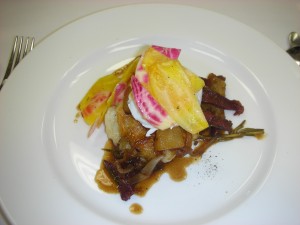
Saturday dawned bright and cool as the judges and chefs, each with his chosen sous chef, made their way to Okanagan College for the Black Box competition. Start time was 8:00 a.m. but the production team, assisted by the invaluable Chef Michael Lyon of Hotel Eldorado, himself a two-time winner of Gold Medal Plates regional events, had already been busy for hours preparing the arena. We were expecting a crowd of hundreds and we were not disappointed. The chefs and sous chefs were introduced then forced to surrender their cell phones and BlackBerries before being led away to their sequestered lair, to be summoned when their turn came.
Judge Perry Bentley had chosen the ingredients for the black box, all of which had to be used by the chefs in their two dishes. It was a deliberately challenging inventory: two large Dungeness crabs, alive and kicking, courtesy of Codfathers Seafood market; a smoked wild boar shank from North Okanagan Game Meats; a gnarly little liquorice root dug up on Vancouver Island and acquired through Mikuni Wild Harvest (a tricky ingredient to use as the liquorice flavour only emerges when it’s cooked and must be used sparingly or its bitter pungency can overwhelm a dish); some gorgeous local heritage candy cane and golden beets from Green Croft Gardens; and some juicy Asian kosui pears, grown in B.C.. Each chef had access to an identical pantry of vegetables, dairy, herbs, spices, oils, stocks, wine, flours and seasonings to enhance the mystery ingredients, and they all rose manfully to the occasion, completing plating within their allotted hour, all except Dan Walker who went over time by 90 seconds, a mistake that cost him points with the judges.
Andrew Fung from Edmonton led off the contest. He boiled his crabs in a lemon court-bouillon then used the meat to make a tasty crab cake, stirring in onion and garlic and coating the cake in panko crumbs. With it he made a relish of shredded golden beets and chunks of crunchy Asian pear dressed with vinegar and sugar. For his second dish he braised and pulled the boar meat, setting it over a creamy potato “risotto” flavoured with thyme and (ever so subtly) with the liquorice root. A sweet salad of pickled candy cane beet finished the dish.
Robert Clark from Vancouver went next. He too made a beautifully textured crab cake, spiked with mustard and cilantro and bound with a little egg. He paired it with a salad of grated pear and cilantro and a tart liquorice butter sauce that cut the richness of the crab nicely. Having tenderized the boar (a crucial first step) he diced the meat and aranged it in the bottom of a bowl with pickled beet, basil leaves and a little basil oil then joined the judges in their chamber to finish the dish by pouring on a thick velouté of golden beets, quickened with more of the liquorice root. It was a visually stunning presentation and tasted as good as it looked.
Dan Walker from Saskatoon’s first dish was a riot of colour – a boar shank ragout set over beet and potato rösti beside a bright yellow purée of liquorice root and golden beet, garnished with crunchy pickled candy cane beets. He also made a crab cake, mixing the crab with shallots, ginger, garlic, tomato, basil and cilantro; a pear purée served as a splendid sauce and a tomato concassé was the final flourish.
Martin Juneau from Montreal was our fourth competitor. His crab salad moistened with cilantro-scented cream delighted the judges, set as it was in the centre of a pool of strongly vinegared tomato-and-onion gazpacho, ringed by olive oil. His boar dish was like an extrapolation of a breakfast, the shank cut into pieces and arranged over a sweet-sour onion, Asian pear and liquorice marmalade together with a hearty potato pancake. He set a perfectly poached egg on top and crowned the whole ensemble with shaved raw beets.
Michael Moffatt from Ottawa made the dishes that scored highest with the judges that morning – the juicy crab meat posed in a cold, delicate tomato consommé. He used the liquorice to flavour a salad of julienned Asian pear and also in the garnish, a tangle of confited lemon zest. His tender boar meat lay on a bed of creamy potato and beet “risotto” ringed with a pungent salsa verde of many herbs.
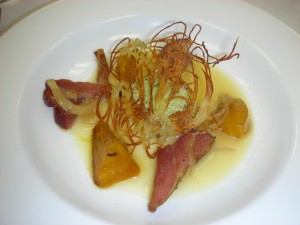
Duncan Ly from Calgary created a stunning presentation of lightly sautéd crabmeat with liquorice-infused cream and a hollandaise sauce, beside a slaw of Asian pear and cilantro. He braised the boar shank and set it in its own clear broth with a perfect potato fondant, firm chunks of the beets and a diadem of crispy potato threads.
Frank Dodd, representing Toronto, made best use of the Asian pear, turning small spheres of the fruit and poaching them with liquorice, bringing out just the right amount of liquorice flavour. He made a syrup from the pear juice and used both to accompany a chilled salad of crabmeat with basil and olive oil. He cooked down his boar meat until it was tender and shredded it between two discs of pasta like a giant, open raviolo, moistened by the boar broth. With this, he served chunks of perfectly cooked beet then set a poached egg on top, its runny yolk acting as a second sauce.
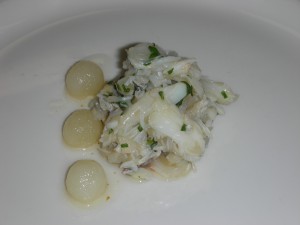
Our final competitor was Jeremy Charles from St. John’s. He used both the crabmeat and the finely diced and fried boar shank in one dish, tossed with fettucine (made à la minute) sharpened with lemon zest, white wine and a tomato concassé. His second dish was vegetarian – chunks of crisp raw pear and sliced beets dressed with a liquorice vinaigrette and pear purée, crowned with crisp matchstick frites.
And that was the Black Box competition. The judges were most impressed by the dishes they tasted, but hoped fervently that smoked boar shank was not on the menu for the evening’s Grand Finale in the Delta Grand hotel.
In past years, the CCC’s Grand Finale has been a relatively small affair. Saturday night’s event was anything but – a major gala that began with a VIP reception featuring Victoria gin and wineries from the Naramata Bench Winery Association and ended with a sit-down dessert, inspiring words from Adam Kreek, great music from Colin James, Barney Bentall and their attendant musicians, and a most successful auction (I’m proud to say the winning bidder for the trip I’m leading to hike the Yorkshire Dales in June paid $12,000 to join the party). In between, 600 guests from across the country tasted each chef’s signature dish and matching wine, moving from station to lavishly decorated station. We the judges sat in grandeur at a spotlit table and had the plates brought to us. As one might expect, the gastronomic standards were exceptionally high. Here are the dishes the chefs presented, in the order in which we tasted them determined by the weight of the food and wine.
Frank Dodd, representing Toronto, wowed us once again with his technical skills and imagination. In the centre of his plate sat a miniature glass cloche filled with smoke pumped in from a tray of smoldering vine wood. We lifted the cloche and there was a slice of succulent salmon that had been cured in icewine and smoked, then wrapped around a finger of pickled golden beet and a small bundle of seedlings and baby spinach leaves. Beside it was a tiny perfect spherical croquette made with potato and Monforte Toscano cheese, a few dots of icewine syrup and a sweet-tart popsicle made of beet juice and icewine sorbet. The fascinating little collation worked brilliantly with Dodd’s chosen wine, the fruity Brut Rosé sparkling wine from Trius.
Duncan Ly from Calgary also chose to work with salmon, bringing his supplier to the party. He in turn brought two mighty coho salmon he had caught off the Queen Charlotte Islands, each as big as a man’s leg, displaying them on a bed of ice. Chef Ly cooked the salmon fillets sous vide until they were meltingly soft then cut a piece for every plate, sprinkling it with a crunchy powder made of crushed duck crackling. Beside it was a slice of duck torchon, the tender, ruby-coloured breast rolled with duck confit rillettes and wrapped in duck prosciutto. A purple stripe of beet emulsion was dotted with tiny segments of peeled orange and garnished with a curly, very crunchy cranberry-nut cracker. Chef Ly’s wine was the tangy 2009 Tantalus Riesling from the Okanagan, its racy acidity in dramatic contrast to the soft, sweetish flavours of the dish.
Michael Moffatt from Ottawa was the next chef to bring his dish to the judges’ table. He had sliced a firm, coarsely textured and deliciously flavourful terrine of rabbit, studded with pistachios and set it on a crisp melba toast, topping the meat with finely diced pickled pineapple. Beside it, he had impaled some tender grilled squid on a fork with a taro-flour tortellini, both generously dressed with lush, creamy bonemarrow butter sauce – an amazing mouthful. The third element on the plate was a “duck reuben” – thick, juicy slices of corned duck breast, cooked rare, draped over a mellow sauerkraut and topped with crumbled motes of aged Beemster cheese that had somehow been rendered crunchy. It all proved a fine match to the 2008 Pinot Gris from Fielding Estates in Niagara.
Robert Clark from Vancouver followed next, making magic from Fraser Valley quail. “I created this dish entirely to match the wine,” he explained, and indeed it was the pairing of the evening, brilliantly wed to the white Bordeaux-style 2008 Alibi from Black Hills in the Okanagan. Chef Clark had poached the small plump breast of the quail then glazed it with orange citrus. He turned the wee leg into a ballotine stuffed with a citrus-scented farce. A quail egg, cooked sous vide so that its white was set but its yolk still runny was coated in a delicately crunchy powder made from the crisped and ground-up quail skin; the egg was set on a coin-sized puck of French toast flavoured with coriander seed. In a tall shot glass, two Lilliputian mushrooms bobbed about in piping-hot quail consommé, its flavour disarmingly pure, while a slice of kumquat could be seen drowned at the bottom, gently adding a citrus hint to the soup. The jus on the plate was a reduction of the consommé and a mound of fragrant coriander salt allowed the judges to season things to their taste.
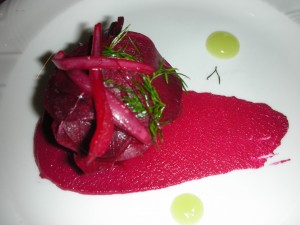
Martin Juneau from Montreal was our fifth competitor. He confited St-Canut piglet belly until the fat almost melted into jelly and the lean milk-white flesh was improbably soft, the skin a delicate, brittle crisp. Then he glazed the meat with red beet juice and heaped it with dill fronds, pickled beet and strips of crunchy onion pickled in beet juice. A broad stripe of purple beet purée painted the plate which was also decorated with intensely flavourful dots of dill-green apple jelly. Chef Juneau paired his dish with a dazzling aged apple cider from La Face Cachée de la Pomme cidery in Quebec, the 2007 Cuvée Dégel Reserve – a brilliant match.
Up next was Dan Walker from Sakatchewan with a rustic, seasonal dish that he felt fully represented the province. Front and centre was a moist fillet of bacon-wrapped Saskatchewan pickerel dusted with lemon, dill and salt. Beside that were two slices of a dainty cabbage roll filled with a stuffing of finely ground elk meat seasoned with garlic and onion. A mound of buckwheat groats with the texture of Israeli couscous added body to the dish while a swirl of puréed beet and two wands of air-dried carrot brought colour and sweetness. A drizzle of apple cider gastrique finished the plate. Chef Walker found a good match to the elk and bacon in the 2009 Pinot Noir from Road 13 in the Okanagan.
Andrew Fung from Edmonton was the penultimate contender, presenting a slice of Asian-style pork belly darkly marinated in soy. Bringing acidic contrast to the meat were some juicy sautéed pieces of Granny Smith apple and a tangy Asian slaw dressed with sugar and vinegar. Slices of peppery duck-and-blueberry sausage provided a second protein and a toasted pistachio biscotti served as a most original garnish. Chef Fung worked with another wine from Road 13, the 2008 Jackpot Pinot Noir.
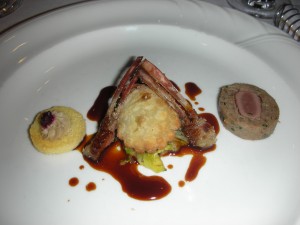
Jeremy Charles from St. John’s brought our final dish, a treatment of wild Newfoundland rabbits he had trapped himself. Everything on the plate was sized for a doll’s house – the tiny frenched rack of ribs, the swirl of rabbit liver mousse on a crunchy coin of Melba toast, the slice of roulade made with the tenderloin set in a firm matrix of herb-scented, confited leg meat. Perched on top of a mound of steamed Brussels sprout leaves flecked with rabbit bacon was a crispy raviolo filled with braised leg meat, mushroom duxelles, a dot of feta and a trace of sweet date. A turned baby carrot seemed like something out of Beatrix Potter and for sauces Chef Charles had made a purée of Jerusalem artichoke and a dark sticky reduction of the braising jus. The dish was a technical tour de force that worked beautifully with Ravine Vineyard’s 2008 Merlot from Niagara.
While the guests found their seats in the hotel’s ballroom and settled down to the show, the judges retired to their lair to deliberate and enter their scores. It had been a most interesting weekend. Three chefs had pulled ahead of the pack during the first, Wine-Matching Challenge; a fourth competitor had aced the Black Box. Three or four chefs stood out in the Grand Finale. We knew the marks would be close – they always are at the CCC with chefs of this extraordinary calibre. At last the moment came to announce the medalists and summon them to the podium. But first the judges were invited up on stage and presented with a small token of appreciation from the Gold Medal Plates organisation – a solid gold toothpick – a gift both beautiful and practical.
Winning the bronze medal was chef Robert Clark of C restaurant in Vancouver, B.C.
Winning the silver medal was chef Jeremy Charles of Raymonds in St. John’s, Newfoundland.
Our gold medallist and new Canadian Culinary Champion was Chef Martin Juneau from Newtown in Montreal, Quebec.
Huge congratulations to him, his team, his cider-maker – and to all the chefs and winemakers who were part of an incredibly successful weekend. We’ll be back in Kelowna this time next year to do it all again with different dishes, wines and a new cast of chefs. I for one cannot wait.

A remarkably eloquent essay. Thank you.
A wonderful recap of a tremendous competition. Can’t wait to attend again next year in Kelowna.
The length of your report took my breath away. I wanted Martin Juneau to win because I long to eat his Grand Finale dish and had already noted his crab concoction.
The photographs have improved – especially the Chefs!
Are detailed recipes available? If not, they should be since the Chefs have taen so much trouble.
It is obvious that you love words almost as much as food – the Competition is lucky to have you.
Thank you, Ophelia. I’m glad you think the photographs have improved. The reason is that the photo of the chefs on the podium was taken by my colleague Andrew Morrison, not by me. I shall pass on your approval to him. I’m afraid we don’t have recipes for the dishes. We already ask so much of the chefs, I don’t think we can make them write their work down as well. Thanks again for writing in.